-

新人教版高中英语必修2Unit 3 The Internet-Listening &Speaking&Talking教案一
Listening and Speaking introduces the topic of “ask about online habits”. Many middle school students have been surfing the Internet for many years, but what they do with the Internet and how much time they spend every day may not be very clear to themselves, nor to other students. This section allows students to investigate their peers' Internet use, which is conducive to their mutual understanding and understanding of the Internet. It can also help them reflect on their own online behavior, learn from other people's good online habits, and get rid of their bad online behavior.The listening text of this section is an investigation interview. The investigators interview specific groups with the same questions to obtain information, so as to understand their views, practices or attitudes on this issue. There are two specific questions: “how much time do you spend online every day? What do you usually do online?”. The answers of the three respondents provide rich and different information, and achieve the purpose of the investigators. The oral discourse structure of survey interviews generally includes greeting and explaining the purpose of the interview, presenting the interview questions and the respondents' answers. Listening and Talking introduces the theme of “choosing the right application ". Listening text is a conversation between Laura and Xiao Bo. In this part of listening, “oink”; “piggy bank” may cause the students' hearing comprehension limitation. Oink refers to sound word and pig's sound. So, add some oink to my piggy bank is often used to describe "making a little money".1. Guide students to understand the content of listening texts in terms of listening for definitions.2. Cultivate students' ability to define words and understand an investigation interview.

新人教版高中英语必修2Unit 3 The Internet-Reading and Thinking教案二
Q5:What's Jan's next goal?Her next goal is to start a charity website to raise money for children in poor countries.Q6:What can we learn from her experiences?We learn that when we go through tough times, we can find help and support from other people online. We learn that we can feel less lonelyStep 5: While reading---rethinkingQ1: What is Jan’s attitude to the Internet ?Thankful/Grateful, because it has changed her and her life.Q2: What writing skills is used in the article ?Examples(Jan’s example, the 59-year-old man’s and the 61-year-old woman’s example)Q3: Can you get the main idea of the article ?The Internet has changed Jan’s life/Jan’s life has been changed by the Internet.Step 6 Post reading---Retell the storyMuch has been written about the wonders of the World Wide Web. There are countless articles (1)telling(tell) us how the Internet has made our lives more convenient. But the Internet has done a lot (2)more(much) for people than simply make life more convenient. People’s lives (3) have been changed(change) by online communities and social networks so far. Take Jan for example, who developed a serious illness that made her (4)stuck(stick) at home with only her computer to keep (5)her(she) company. She joined an online group (6)where she could share problems, support and advice with others. She considered the ability to remove the distance between people as one of the greatest (7)benefits(benefit). She was so inspired (8)that she started an IT club in which many people have been helped. She has started to learn more about how to use the Internet to make society better. Her next goal is to start a charity website to raise money (9)for children in poor countries. Jan’s life has been (10)greatly(great) improved by the Internet.

新人教版高中英语必修2Unit 3 The Internet-Reading for Writing教案二
8. However, the more polite you are, the less likely it is you will be attacked. 然而, 你越有礼貌, 你被攻击的可能性就越小。 Step 8 Writing---the articleHow to stay safe in the online chat roomToday I thought I’d blog about a question that has been asked many times--- how do you stay safe online and avoid bad experiences in the online chat room ? I’m not an expert, but many years as a blogger have taught me a thing or two.First of all, there’s the golden rule of the Internet: keep out of what makes you uneasy. Don’t post comments or click on anything. Second, protect your privacy. Don’t give out too much private information like your address, phone numbers, the ID numbers, etc. Third, be polite. If you are polite to others on the Internet, you won’t be attacked in normal situation. Finally, don’t believe in others easily and never meet someone you met online alone. It is very dangerous.Have you had any bad experiences online, or do you have some good advice for staying safe? Post your comments below!Step 9 Pair workExchange drafts with a partner. Use this checklist to help your partner revise his/her draft.1. Does the writer tell the reader what he/she know about the topic ?2. Are the tips and suggestions well organised ?3. Has the writer defined the new words ?4. Does the author include examples, comparison, or explanations ?5. Does the writer end by asking readers to leave comments and/or suggestions ?6. Can you find any grammar or spelling mistakes.Step 6 HomeworkPut up your revised draft in the classroom or read it to your class.

新人教版高中英语必修2Unit 4 History and Traditions-Discovering Useful Structure教案二
This teaching period mainly deals with grammar: The past participle is used as attributive and objective complement.1. Guide students to review the basic usages of the past participle used as attributive and objective complement.2. Lead students to learn to use some special cases concerning the past participle used as attributive and objective complement flexibly.3. Strengthen students’ great interest in grammar learning.1. Help students to appreciate the function of the past participle used as attributive and objective complement.2. Instruct students to write essays using the past participle used as attributive and objective complement.Step1:温故而知新。Analyze the underlined phrases and then sum up the common usages of the past participles.1.(教材P41)They had castles built(build) all around England, and made changes to the legal system.2.(教材P42)They use the same flag, known(know) as the Union Jack,...3.(教材P42)Judy and I had our car parked(park) in an underground car park near Trafalgar Square, where we could get our car battery charged(charge).Common points: f the past participle used as attributive and objective complement.Step 2:过去分词作定语时的意义1.及物动词的过去分词作定语,在语态上表示被动;在时间上,常表示动作已经发生或完成,有时也不表示时间性。Our teacher watched us doing the experiment and gave us a satisfied smile at last.我们的老师看着我们做实验,最后给了我们一个满意的微笑。The plan put forward at the meeting will be carried out soon.会上提出的计划将很快被执行。2.不及物动词的过去分词作定语,它不表示被动意义,只强调动作完成。Many little kids like gathering fallen leaves in the yard.

新人教版高中英语必修2Unit 4 History and Traditions-Reading and Thinking教案二
Step 5 While reading---Task 3Read the text again and answer the following questions.Q1: How many countries does the UK consist of ?4 Q2: What are the four countries of the United Kingdom?England, Wales, Scotland and Northern Ireland Q3: Which two were the first to be joined together ?England and WalesQ4: What are the two chief advantages of studying the history of a country ?The first one is to help you understand more about the country and its traditions.The second one is to make visiting it more enjoyable.Q5: What’s the author’s attitude towards studying the history ?Supportive/positiveStep 6 Post reading---Retell the textThe United Kingdom, Great Britain, Britain, England—many people are confused by (1)_____ these different names mean. In the 16th century, the nearby country of Wales (2) __________(join) to the Kingdom of England. In the 19 th century, the Kingdom of Ireland was added to create the United Kingdom of Great Britain and Ireland. Finally, the southern part of Ireland (3) ______ (break) away from the UK, which resulted in the full name we have today. However, most people just use the (4)_________(shorten) name: the UK. The four countries (5)__________ belong to the United Kingdom work together in some areas. There were four sets of invaders and the last group were the Normans. They had castles (6)_________(build) all around England and made changes (7)__________ the legal system. Studying the history of the country will make your visit much more (8)_________(enjoy). The capital city London is (9)___ ancient port city that has a history (10)______(date) back to Roman times. 1. what 2.was joined 3.broke 4.shortened 5.that 6. built 7.to 8.enjoyable 9.an 10.dating Step 6 Homework

新人教版高中英语必修2Unit 4 History and traditions教案
这个地区有着深厚的传统。既学既练:为了让更多的外国游客了解中国文化,欣赏中国美丽的自然风光,感受中国发生的巨大变化,某外文杂志社将出版一本英语小册子来介绍中国的旅游景点。该杂志社邀请你为该小册子写一篇英语短文来介绍杭州,内容包括:1.杭州的位置(中国东南部)、面积(16 000多平方公里)及历史(2 200多年)等;2.杭州的旅游特色(自然风景、传统文化、特色小吃等);3.希望更多的游客来杭州参观。注意:1.词数80左右;2.可适当增加细节,以使行文连贯。Located in the southeast of China, Hangzhou is a beautiful city.Dating back more than 2,200 years, Hangzhou covers an area of more than 16,000 square kilometers.In Hangzhou, you can visit the West Lake, whose scenery is fascinating.In addition, you can’t miss its cultural relics and historical sites, from which you will learn more about excellent Chinese traditional culture and traditions.In Hangzhou, the special snacks are famous and visitors from different parts of the world think highly of them.As a tourist attraction, Hangzhou attracts a large number of visitors from home and abroad every year.Once you come to China, Hangzhou is a scenic spot you can’t miss.

新人教版高中英语必修2Unit 5 Music-Listening&Speaking&Talking教案
choir memberspeople to run food stands people to sell festival ticketspeople to sell music CDspeople to set up equipmentmusical performersStep 2: Listen to the announcement again and answer the questions. ? 1. What kind of songs will Grace Davis sing at the festival?? 2. Who can try out as a performer?? 3. What can those who think they do not have musical talent do?? 4. How can students volunteer to take part?? Talking about preferences:? Would you prefer doing ..?? What would you prefer to do?? Would you rather do .... or ….?? What would you rather do?? I'd prefer .... to ..? I'd rather have ... than .. Step 3: Speaking ProjectWork in groups. Role-play the conversation or make a new one.? Debbie: Where have you been? You missed the announcement about the music festival.? John: I was at the doctor's office. Music festival?? Frank: Yes, it's going to be next month on the school sports field. John, you can play the piano. How about playing it at the festival?? John: Well, I'd rather play the violin. I can play Liang Zhu.? Frank: Wow! Sounds good. What about you, Debbie? ? Debbie: Actually, I don't have much musical ability. I'd prefer just to help out with the crowds.? Frank: You can sell tickets or work at a food stand.? John: So can I assume that the aim of the festival is to raise money?? Debbie: Yes. All of the money will go to charity.

新人教版高中英语必修2Unit 5 Music-Discovering Useful Structures教案一
Step1:自主探究。1.(教材P52)Born(bear) in the USA on 2 January 1970, Whitacre began studying music at the University of Nevada in 1988.2.(教材P52) Moved(move) by this music, he said, “It was like seeing color for the first time.”3.(教材P56)I was very afraid and I felt so alone and discouraged(discourage).4.(教材P58)Encouraged(encourage) by this first performance and the positive reaction of the audience, I have continued to play the piano and enjoy it more every day.Step2:语法要点精析。用法1:过去分词作表语1).过去分词可放在连系动词be, get, feel, remain, seem, look, become等之后作表语,表示主语所处的状态Tom was astonished to see a snake moving across the floor.汤姆很惊讶地看到一条蛇正爬过地板。Finally the baby felt tired of playing with those toys.终于婴儿厌倦了玩那些玩具。注意:1).过去分词作表语时与被动语态的区别过去分词作表语时,强调主语所处的状态;而动词的被动语态表示主语是动作的承受者,强调动作。The library is now closed.(状态)图书馆现在关闭了。The cup was broken by my little sister yesterday.(动作)昨天我妹妹把杯子打碎了。2)感觉类及物动词的现在分词与过去分词作表语的区别过去分词作表语多表示人自身的感受或事物自身的状态,常译作“感到……的”;现在分词多表示事物具有的特性,常译作“令人……的”。

新人教版高中英语必修2Unit 5 Music-Reading for Writing教案二
The Internet celebrity Gao Yifeng. Years ago, he owned 5 companies and the staffs over 1,000, but during the economy crisis, he became nothing but debt. He was so worried that his hair became white overnight. There was a time when he wanted to killed himself. But after listening to the song Start Over by Liu Huan, he decided to cheer himself up. He started a steamed bun shop and gradually became a national chain shops. Now he became successful again.Walter Haddon said, “Music is the medicine of a troubled mind.” Music contains such a pleasant and inspiring force. Music gave him courage and bravery. When he listened to the song, it made his spirit fly like a kite in the wind. Music gave him strength and brought him relief. It was the rock I leant on to become strong and to get through those hard times. I hope none of us have to go through the same kind of suffering that he did. At the same time, we all go through various periods when we feel sad or alone. During those times, music can help us in the same way that it helped him. I hope we all will somehow begin to treasure music and make it a part of our life. Thank you for your listening !5.Revise your writing each other.Does he/she explain how music has changed his/her/someone else’s life?Are some of the rhetorical devices included and used properly ?Does he/she talk about how music makes him/her/someone feel?Is the first word in each sentences capitalised?Does he/she use correct punctuation ?
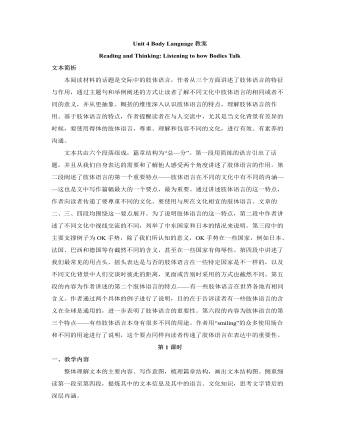
新人教版高中英语选修1Unit 4 Body Language教案
本阅读材料的话题是交际中的肢体语言,作者从三个方面讲述了肢体语言的特征与作用,通过主题句和举例阐述的方式让读者了解不同文化中肢体语言的相同或者不同的意义,并从更抽象、概括的维度深入认识肢体语言的特点,理解肢体语言的作用。基于肢体语言的特点,作者提醒读者在与人交流中,尤其是当文化背景有差异的时候,要使用得体的肢体语言,尊重、理解和包容不同的文化,进行有效、有素养的沟通。文本共由六个段落组成,篇章结构为“总—分”。第一段用简练的语言引出了话题,并且从我们自身表达的需要和了解他人感受两个角度讲述了肢体语言的作用。第二段阐述了肢体语言的第一个重要特点——肢体语言在不同的文化中有不同的内涵——这也是文中写作篇幅最大的一个要点,最为重要。通过讲述肢体语言的这一特点,作者向读者传递了要尊重不同的文化、要使用与所在文化相宜的肢体语言。

新人教版高中英语必修3Unit 5 The Value of Money-Discovering Useful Structures导学案
4.They were going to find someone to take part in their bet when they saw Henry walking on the street outside.[归纳]1.过去将来时的基本构成和用法过去将来时由“would+动词原形”构成,主要表示从过去某一时间来看将要发生的动作(尤其用于宾语从句中),还可以表示过去的动作习惯或倾向。Jeff knew he would be tired the next day.He promised that he would not open the letter until 2 o'clock.She said that she wouldn't do that again.2.表示过去将来时的其他表达法(1)was/were going to+动词原形:该结构有两个主要用法,一是表示过去的打算,二是表示在过去看来有迹象表明将要发生某事。I thought it was going to rain.(2)was/were to+动词原形:主要表示过去按计划或安排要做的事情。She said she was to get married next month.(3)was/were about to+动词原形:表示在过去看来即将要发生的动作,由于本身已含有“即将”的意味,所以不再与表示具体的将来时间状语连用。I was about to go to bed when the phone rang.(4)was/were+现在分词:表示在过去看来即将发生的动作,通常可用于该结构中的动词是come,go,leave,arrive,begin,start,stop,close,open,die,join,borrow,buy等瞬间动词。Jack said he was leaving tomorrow.
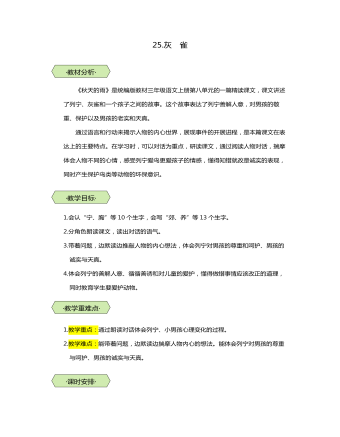
统编版三年级语文上第25课灰雀教学设计教案
《秋天的雨》是统编版教材三年级语文上册第八单元的一篇精读课文,课文讲述了列宁、灰雀和一个孩子之间的故事。这个故事表达了列宁善解人意,对男孩的敬重、保护以及男孩的老实和天真。通过语言和行动来揭示人物的内心世界,展现事件的开展进程,是本篇课文在表达上的主要特点。在学习时,可以对话为重点,研读课文,通过阅读人物对话,揣摩体会人物不同的心情,感受列宁爱鸟更爱孩子的情感,懂得知错就改是诚实的表现,同时产生保护鸟类等动物的环保意识。 1.会认“宁、胸”等10个生字,会写“郊、养”等13个生字。2.分角色朗读课文,读出对话的语气。3.带着问题,边默读边推敲人物的内心想法,体会列宁对男孩的尊重和呵护、男孩的诚实与天真。4.体会列宁的善解人意、循循善诱和对儿童的爱护,懂得做错事情应该改正的道理,同时教育学生要爱护动物。 1.教学重点:通过朗读对话体会列宁、小男孩心理变化的过程。2.教学难点:能带着问题,边默读边揣摩人物内心的想法。能体会列宁对男孩的尊重与呵护、男孩的诚实与天真。 2课时
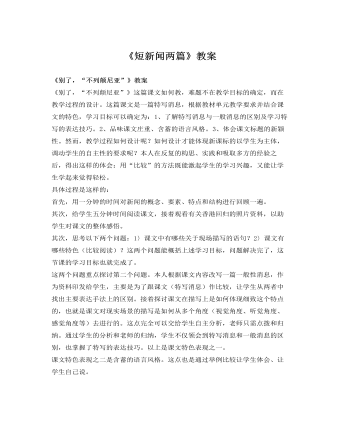
人教版高中语文《短新闻两篇》教案
罗森塔尔突破了“客观报道”“零度写作”的框框,把自己和其他参观者在奥斯维辛访问时的感受当做文章的主要内容来写,传达出每一个良知者的共同心声。教师总结:细节描写是耐人寻味的。文章没有阴森恐怖的镜头,没有血腥的画面,只是重现了新闻的事实真相,但透过细节却能引发人们对生命,对人性的思考。在作者看似平静的叙述中抒发了对德国纳粹残酷暴行的沉重控诉,更表达了作者对自由、和平与祥和的向往四、拓展延伸:《奥斯维辛没有什么新闻》这一作品本身的价值在哪?社会价值又在哪,能不能从这两个角度思考,几人合作试写一段颁奖词?范例:《奥斯维辛没有什么新闻》突破新闻“零度写作”原则,着眼细节,以冷峻的视角,深沉地描述了今天的奥斯维辛集中营纪念馆。在恐怖与快乐、战争与和平、历史与现实的反差中,它召唤起人们关于灾难的记忆、关于生命的思考、关于人性的自省。它的发表充分地表现了一个新闻记者的使命感,更以迫人的力量震撼生者的心,成为新闻史不朽的名篇。
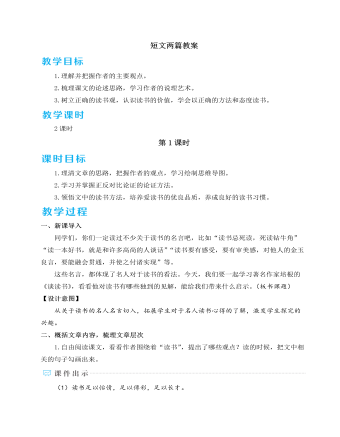
人教部编版语文九年级下册短文两篇教案
一、新课导入同学们,你们一定读过不少关于读书的名言吧,比如“读书忌死读,死读钻牛角”“读一本好书,就是和许多高尚的人谈话”“读书要有感受,要有审美感,对他人的金玉良言,要能融会贯通,并使之付诸实现”等。 这些名言,都体现了名人对于读书的看法。今天,我们要一起学习著名作家培根的《谈读书》,看看他对读书有哪些独到的见解,能给我们带来什么启示。(板书课题)【设计意图】从关于读书的名人名言切入,拓展学生对于名人读书心得的了解,激发学生探究的兴趣。二、概括文章内容,梳理文章层次1.自由阅读课文,看看作者围绕着“读书”,提出了哪些观点?读的时候,把文中相关的句子勾画出来。(1)读书足以怡情,足以傅彩,足以长才。(2)读书时不可存心诘难作者,不可尽信书上所言,亦不可只为寻章摘句,而应推敲细思。(3)书有可浅尝者,有可吞食者,少数则须咀嚼消化。(4)读书使人充实,讨论使人机智,作文使人准确。(5)读史使人明智,读诗使人灵秀,数学使人周密,科学使人深刻,伦理学使人庄重,逻辑修辞之学使人善辩:凡有所学,皆成性格。
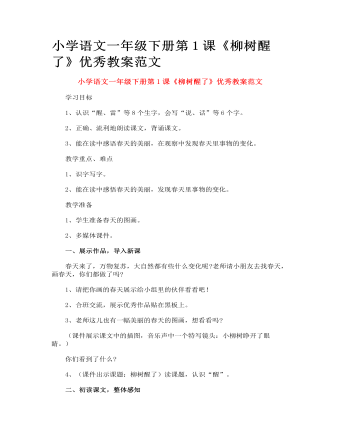
小学语文一年级下册第1课《柳树醒了》优秀教案范文
朗读背诵,感悟课文 1、你从什么地方知道柳树醒了?分小组交流交流。 (根据学生的回答依次学习相应小节。) 2、学生在读书交流中,随机出示课件中相应小节,帮助领悟,读好“醒、软、绿、飞、高”等词。 第一节:(课件出示:天空春雷一声响,地下一棵棵柳树摇了摇身子。) 想象:春雷会跟柳树说什么? 第二节:(课件出示:春雨沙沙,柳枝渐渐吐绿,向下垂。) 你觉得这一小节该怎样读呢? 第三节:(课件出示:春风吹动柳枝,柳枝飘荡) 引读,你们瞧!春风给柳树梳头,梳着梳着——(生读)。 第四节:谁想读第四节?谁知道“小柳絮”是什么样儿的?理解“柳絮”:(课件出示:一双燕子在空中飞来飞去,柳树上沾满上面结满有白色绒毛的种子,绒毛随风飞散。) 第五小节:(课件出示:柳树枝条在风中飘荡,孩子们在树下玩耍。)看,小柳树醒了,它在干什么?会班齐读。 3、再读读课文,想想:你从哪里知道“柳树醒了”?“柳树醒了”说明什么? 4、和同桌小伙伴一起试着背背课文,比比谁先会背。(课件出示课文插图,同时配乐。)
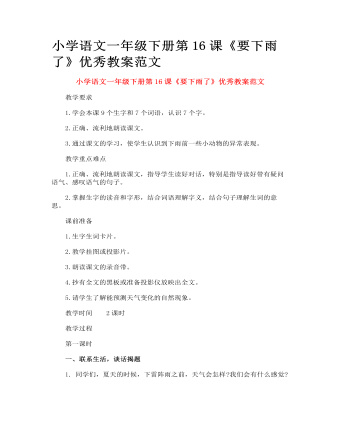
小学语文一年级下册第16课《要下雨了》优秀教案范文
由扶到放,学习课文 1.指导学习一至三段。 (1)指名读第一段。学习生字"弯、直",通过做动作理解词义。 (2)练习朗读第一段,可边读边做动作。 (3)教师引读第二段:小燕子从他头上飞过。小白兔大声喊--(学生读)。 (4)引导学生看第一幅挂图:小燕子飞得很低,小白兔奇怪地向燕子为什么飞得这么低。学生练习朗读小白兔喊叫的句子,提醒学生注意提示语"大声喊"和句尾问号。 (5)先指名读第三段,然后逐句以问引读: ① 教师指第一句问:燕子边飞边说-- ②空气怎么样呢--(学生接读第二句)虫子的翅膀可比鸟的翅膀小多了,薄多了,就像透明的纱一样,沾上了小水珠,就像人背上了铅球一样沉重,自然就飞不高了。再读第二句。 ③那小燕子飞不高是什么原因呢?学生读最后一句,教师板书:捉虫子,学习生字"捉",练习朗读句子。 (6)朗读第三段。
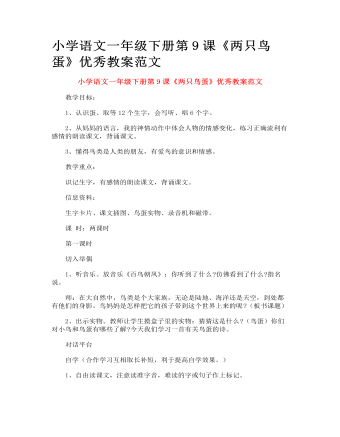
小学语文一年级下册第9课《两只鸟蛋》优秀教案范文
朗读(读说思议练结合,培养学生语文综合能力。) 1、学习第一小节: (1)指名读,回忆刚才摸鸟蛋的感觉(小小的、凉凉的)体会着读一读。 (2)比较“鸟蛋凉凉的”和“凉凉的鸟蛋”:你发现了什么?(引导学生发现这类词语的特点:词序不同,但表达的意思相同。)除了凉凉的鸟蛋还有什么是凉凉的? (3)你还能像这样再说几个吗? (如果学生说不出来,教师可进行指导,把写有“花儿、小草、柳枝、大海,红红的、绿绿的、软软的、蓝蓝的”的词语卡分给学生,让拥有不同词语的学生去找朋友,再让两个朋友变换左右顺序。) 2、学习第二小节: (1)轻声读文,思考:你怎么知道两只鸟蛋就是两只小鸟? (2)出示小鸟破壳的图片或课件,引导学生说一说。 (3)启发想象:鸟妈妈焦急不安是什么样?你能表演一下吗? 表演后试着把妈妈的语气读出来。 (4)你还能用焦急不安说句话吗?看谁说得和别人不一样? 背诵(采用多种形式调动学生背诵积极性,帮助学生有意识地积累语言。) 练习有感情的背诵前两个小节。
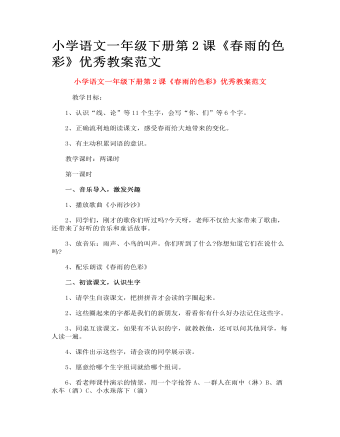
小学语文一年级下册第2课《春雨的色彩》优秀教案范文
精读课文,理解积累 1、同学们的字记的很好,课文也一定能读出感情来。现在就请同学们带着自己的理解和感受,有感情地读一遍课文,并自己喜欢的一段精读。 2、讨论交流,指导朗读 调整方案: 方案一:通过读文你知道了什么?(这一问题较开放,如果学生已从整体上感知课文内容,即可进入下一环节。如果学生回答只停留在零散的词句上,就按方案二教学。) 方案二:小燕子、麻雀和黄莺它们分别认为春雨是什么色的?他们为什么这么认为?(板贴写有字的小写图片和对应的颜色) 3、小组内讨论:a.如果分角色朗读的话,该怎样读争论的语法,朗读好“不对”“不对,不对”“你们瞧”b.怎样表现春雨小鸟和大自然。 4、根据自己的理解感受小组内分角色读、表演读。 5、请一组同学配乐表演读,学生评价 6、同学们春雨到底是什么颜色的呢?把你的想法说一说,画一画(自选粉笔板画春雨) 7、指导积累。同学们读得真有感情,现在请把你喜欢的词句画下来。
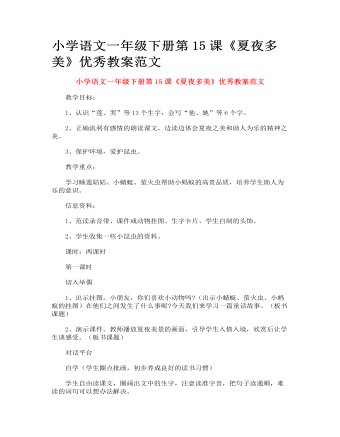
小学语文一年级下册第15课《夏夜多美》优秀教案范文
朗读(多层次自主阅读,拓展思维空间,提高阅读质量。) 1、检查读。教师以开火车的形式让学生按自然段读课文,看谁读得既正确又流利。 2、指正读。把你喜欢的小动物的话找出来读一读,教师随机指导。 3、想象读。先听范读录音,然后指名读文,边读边想象当时的情景。 4、分角色读。教师指导学生研究讨论每个角色的语气怎样读,并尝试给这些角色设计表情动作。 如:睡莲姑姑(奇怪的问):“小蚂蚁,你怎么了?” 小蚂蚁(揉肉眼睛,伤心的)说:“我不小心掉进池塘,上不了岸啦!” (让学生尝试添加提示语,是一个大胆的尝试。让学生根据生活经验和对课文的理解,给“人物”设计表情动作,添加不同的语气词,使课文变成了童话剧。由于是自己创造的成果,学生会读得有情有趣,有滋有味。但这种能力的培养不是一朝一夕的,教师要有意识的加以引导。)
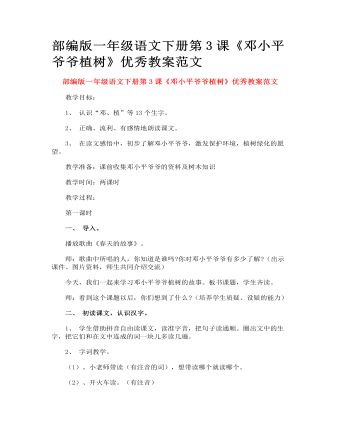
部编版一年级语文下册第3课《邓小平爷爷植树》优秀教案范文
读文感悟。 1、出示:邓小平爷爷( )地种柏树。 师:同学们带着这个问题仔细读课文,用“——”划出有关句子。然后想一想,“( )”里填什么词比较恰当。 2、生自由读课文,边读边划。 3、 全班汇报交流。 师:你认为邓小平爷爷( )地种柏树,从哪些地方体现出来? (以读为主,引导学生学会读课文,尊重学生个性化的理解。“( )”里可填“起劲、仔细、认真、一丝不苟、小心”等等,随机进行读文,结合语言文字训练,体会邓小平爷爷积极为祖国绿化作贡献的精神。) (如:找出邓小平爷爷种树的动作词“挖、挑选、移、填、站在、扶正”,同桌伙伴,一人做动作,一人口述植树过程。“移”字可换“放”字比较理解。) 4、 四人小组讨论:邓小平爷爷为什么种树?他是怎么想的? (结合课前收集的邓小平爷爷的资料理解,体会邓小平爷爷一心为国之心,激发学生参与绿化的热情。)


